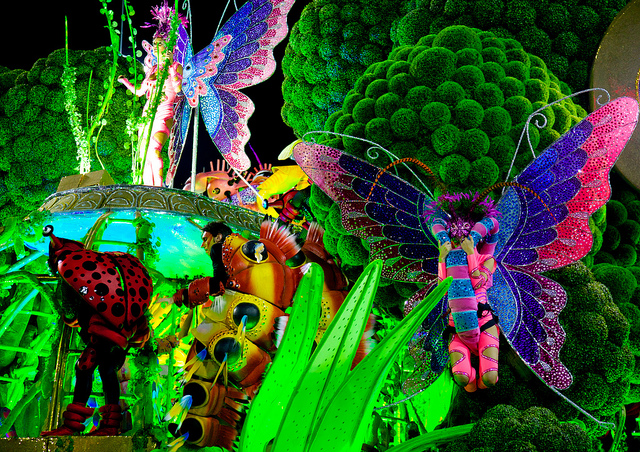Tripatini
the world's smartest travel social network
Once Again, It's Carnival Time in Rio!
Rio de Janeiro‘s greatest and most famous festival is unquestionably one of the world’s, as well, an over-the-top extravaganza of samba schools parading their raucous music, dancing, and extravagant floats and costumes over several consecutive nights (this year, this past Friday through this Tuesday, in 2021, February 12-16) in the “Sambodrome” designed by starchitect Oscar Niemeyer has to be experienced first hand to be fully believed.
Carnaval dates in some form back to the mid-17th century, but the samba schools just back to the 1920s. Most of the 26 schools are associated with particular neighbourhoods – many working-class or poor – and for many participants, at least half the year is spent in designing and rehearsing their schools’ Carnaval entries. It’s a daunting task, full of meticulous detail. There are floats to be built and costumes to be designed and sewn. Each of the schools performs a particular song, and it lyrics and music must be composed, and the dancing to that song choreographed.
Then, of course come months of once- or twice-weekly ensaios (rehearsals), usually from August through the week before Carnaval itself (many samba schools open theirs to the public, and serve food and drink during the proceedings).
In 2019, the winner of Carnaval was Mangueira, a frequent winner and one of the oldest and most traditional samba schools, founded in 1928 in Morro da Mangueira, an area located near the neighborhood of Maracanã Stadium. Its production "History for Lulling Adults", a take on Brazil's history from the perspective of the popular, unsung heroes, including Marielle Franco, a LGBT activist and city councilwoman who was murdered in 2018. This year Mangueira is keeping up its social protest theme with "The Truth Will Set You Free", imagining what would Jesus do if he were to return to today's world. It's one of several schools using their presentations to protest against the divisive right-wing régime of president Jair Bolsonaro.
It’s said that Carnaval – not just in Rio but in Salvador and various other localities where the festivities are held not in a massive stadium but in the streets – is for Brazilians not just a symbol of identity and culture but a kind of emotional catharsis against the difficulties of life in a sometimes troubled country and world. It’s certainly inspiring to see such uninhibited joy set loose every summer (which it is here) around this time.
More info: Rio-Carnival.net.
Videos
Groups
-
Catalonia, Its Culture &…
33 members
-
Barcelona
77 members
-
India
173 members
-
Tour Operators
873 members
-
Ireland
93 members
-
South Dakota
17 members
-
Azerbaijan
17 members
-
Shopping the World
55 members
-
Tech for Travel/Hospital…
87 members
-
Andorra
26 members
-
Online Corner
75 members
-
Minnesota
22 members
-
Backpackers & Hostels
84 members
-
Portugal
60 members
-
Turks and Caicos
26 members
© 2026 Created by EnLinea Media.
Powered by
![]()
Badges | Report an Issue | Privacy Policy | Terms of Service

You need to be a member of Tripatini to add comments!
Join Tripatini